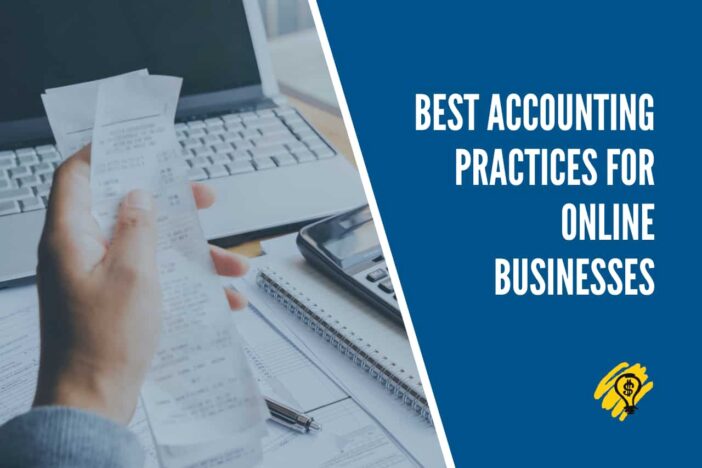Online shopping increased sales during the pandemic since physical stores were forced to close. However, there may be issues with crucial back-office activities, such as not being able to keep up with the massive growth of e-commerce enterprises.
Especially in this scenario, e-commerce is well-known for its high volume of everyday transactions. As a result, accounting data, which is typically maintained on the selling channel rather than in the bank account, is difficult for them to track.
Having said that, the business world has evolved exponentially since the pandemic, and the sky is the limit. So if you run an online business and accounting is not your best suit, this article will provide an overview of some best practices for accounting for online companies.
1. Hire a Qualified Accountant
If you’re not a numbers person, it may be worth your while to hire a qualified accountant. A good accountant can help you keep track of your finances, prepare and file your taxes, and advise you on financial matters. While you may be able to get by with a do-it-yourself accounting software program, there’s no substitute for the professional advice of a qualified accountant.
Aspiring professionals can learn the ropes by enrolling in a program online. Just search for the “masters in accounting online no GMAT” program, and you will find multiple options to enroll in a course for your career without taking the GMAT. The program covers topics such as auditing, taxation, and financial reporting.
2. Keep Accurate Financial Records
This may seem like a no-brainer, but keeping accurate financial records from the get-go is important. It means tracking all income and expenses, keeping receipts and invoices organized, and recording transactions promptly.
Not only is this good accounting practice, but it’s also a legal requirement. The IRS requires all businesses to keep accurate records of their income and expenses. It is essential not only for tax purposes but also for tracking the financial health of your business.
3. Understand Your Tax Obligations
All businesses, whether online or offline, are required to pay taxes. Therefore, understanding your tax obligations and filing your taxes on time is important. If you’re unsure where to start, a qualified accountant can help you understand your tax obligations and ensure that you comply. Besides, paying taxes is one of the costs of doing business, and it’s important to factor this into your budget.
4. Use Accounting Software
There are several accounting software programs on the market, and choosing the right one for your business can save you time and money. When selecting an accounting software program, look for one that is user-friendly, offers features that meet your needs, and is compatible with your computer system.
You should also ensure that the program you select can generate reports that will be useful to you and your accountant. However, don’t feel like you need to purchase the most expensive program on the market – sometimes, the simplest programs are the best.
5. Stay Up-to-Date on Financial News
In today’s ever-changing business landscape, staying up-to-date on financial news is vital. It will help you make informed decisions about your business and protect your bottom line.
There are several ways to stay abreast of financial news, including reading business publications, listening to business news programs, and subscribing to industry-specific newsletters. In addition, don’t hesitate to ask your accountant or financial advisor for advice. They can provide valuable insights into the latest financial news and trends.
6. Review Your Financial Statements Regularly
You should review your financial statements regularly – at least monthly, if not more often. It will help you track your progress, identify areas of improvement, and make informed decisions about your business.
Your financial statements will include your income, balance, and cash flow statements. Reviewing these statements will help you gauge your financial health and track your progress over time. And if you have any questions, don’t hesitate to ask your accountant for help.
7. Create a Budget and Stick to It
Creating a budget is an integral part of financial planning. It will help you track your income and expenses, identify areas of overspending, and make adjustments as needed.
When creating a budget, include all your income and expenses – both fixed and variable. And once you have a budget in place, stick to it as closely as possible. It will help you keep your finances on track and avoid overspending. And also, be sure to review your budget regularly and make adjustments as needed.
8. Understand Your Credit Score
Your credit score is an important factor in your financial life. It’s used to determine whether you’re eligible for loans and credit cards and can also affect the interest rates you’re offered. A good credit score can save you money in the long run, so it’s important to understand how your credit score is calculated and how you can improve it.
9. Make a Debt Repayment Plan
If you’re carrying debt, you must create a plan to repay it. It will help you get out of debt quickly and avoid accruing additional interest charges.
When creating a debt repayment plan, start by listing all your debts from smallest to biggest. Then, budget and allocate as much money as possible to debt repayment. Finally, stick to it once you have a plan and make payments on time.
10. Invest in Your Education
No matter what stage you’re at in your business, continuing to learn and expanding your knowledge is essential. It will help you make informed decisions, stay up-to-date on industry trends, and find new ways to grow your business.
There are several ways to invest in your education, including taking courses, attending conferences, and reading books and articles. And the best part is that you can often deduct the cost of your educational expenses from your taxes.
The Bottom Line:
Accounting is vital for online and offline businesses because it provides critical insights into the company’s financial health. You can make informed decisions about your business by reviewing your financial statements and tracking your progress. And by sticking to a budget and investing in your education, you can ensure that your business is on the right track for long-term success. When it comes to accounting, there is no one-size-fits-all solution. However, by following these best practices, you can stay on top of your finances and make informed decisions about your business.



